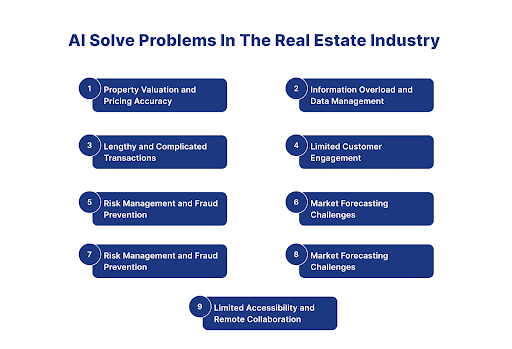AI Solve Problems In The Real Estate Industry: 9 Problems That Can Be Solve By Implementing AI In the Real Estate Industry
We should expect ai solve problems in the real estate industry, but open doors to unimaginable opportunities and development as the sector embraces innovations
Introduction

- Artificial intelligence (AI) integration is causing a substantial shift in the real estate business, a cornerstone of worldwide economies. AI is becoming a game-changer as technology develops, solving a number of issues that have long dogged the industry. This blog examines the problems that artificial intelligence (AI) may help within the real estate sector and how these developments change how we purchase, sell, and manage real estate.
Ai Solve Problems In The Real Estate Industry

1.Property Valuation and Pricing Accuracy
-
In the traditional method of property valuation, real estate companies need to use human resources. Humans can not evaluate property accurately. Sometimes, they can make a higher property valuation if the seller is from his family member. Determining a property's worth accurately has always been challenging, and subjective considerations frequently impact this process.
-
Machine learning algorithms examine enormous datasets that include market trends, property attributes, and similar transactions to provide more accurate property values. This lessens the possibility of overpricing or underpricing by assisting in setting competitive and reasonable prices. In this way, AI solves problems in the real estate industry.
2.Information Overload and Data Management
-
Real estate agents had a difficult time sifting through the massive amount of data about properties, market trends, and client preferences before artificial intelligence. The time-consuming and error-prone manual sorting and analysis hampered decision-making procedures.
-
Real-time insights into property prices, market trends, and client preferences may be obtained using AI-driven analytics systems that can efficiently sort through large amounts of information. Algorithms for machine learning pick up on patterns, which helps them make better predictions and decisions. In this way, AI solves problems in the real estate industry.
3.Lengthy and Complicated Transactions
-
The lengthy and intricate real estate purchase procedure was well-known. Both buyers and sellers were often frustrated by delayed transactions caused by paperwork, legalities, and communication breakdowns.
-
Artificial Intelligence (AI) optimizes the whole real estate transaction process by promoting smooth communication, guaranteeing compliance, and automating repetitive chores. Virtual assistants and chatbots speed up transaction closing by improving client connection. In this way, AI solves problems in the real estate industry.
4.Limited Customer Engagement
-
Conventional outreach and marketing techniques frequently failed to engage potential customers successfully. Missed chances and dissatisfied clients resulted from real estate brokers' inability to customize interactions and provide customized advice.
-
Chatbots and virtual assistants driven by artificial intelligence examine user preferences, browsing history, and interactions to offer tailored recommendations. Real estate agents may interact with customers skillfully and enhance the client experience by knowing their unique requirements and preferences. In this way, AI solves problems in the real estate industry.
5.Risk Management and Fraud Prevention
-
Fraud was a problem for the real estate industry; identity theft, document forgeries, and other illegal activity were big dangers. Manual verification procedures took much time and were not 100% reliable, which allowed for possible fraud.
-
AI improves risk management using reliable fraud detection algorithms and identity verification systems. Real-time monitoring and automated checks help create a more secure environment, which lowers the possibility of fraud in real estate transactions. In this way, AI solves problems in the real estate industry.
6.Market Forecasting Challenges
-
It was difficult to forecast market trends and property demand accurately since there were so many intricate affecting elements. Real estate agents frequently depended on past data, which did not fully capture the market's dynamic character.
-
Artificial intelligence (AI) algorithms examine a wide range of data sources, such as demographic changes, social trends, and economic indicators, to provide more precise market projections. Real estate professionals may improve investment strategies and decrease uncertainty by using machine learning to make real-time data-driven choices. In this way, AI solves problems in the real estate industry.
7.Inconsistent Property Information
- There was sometimes a lack of consistency and uncertainty due to the dispersion of property information across many platforms. The lack of updates in real estate listings, photos, and descriptions confused and lost time for customers and agents alike.

- AI-driven systems compile and update real-time property data, guaranteeing consistency between listings. Both real estate brokers and prospective purchasers benefit from the reduced disparities, more openness, and time savings that come with this centralized strategy. In this way, AI solves problems in the real estate industry.
8.Slow Adoption of Technology
-
Historically, the real estate sector has been slow to accept new technology. Professionals in the industry were resistant to change, and inefficiencies resulted from the high number of manual operations.
-
Artificial Intelligence (AI) is driving the digital revolution in the real estate sector. Processes are streamlined by automation tools, machine learning algorithms, and AI-driven platforms, which makes it simpler for professionals to use technology. This increases industrial competitiveness overall by hastening the adoption of novel solutions. In this way, AI solves problems in the real estate industry.
9.Limited Accessibility and Remote Collaboration
-
Geographical limitations sometimes make it difficult for stakeholders to collaborate and communicate. Real estate transactions need a physical presence, which restricts accessibility for both professionals and clients, particularly in international markets.
-
AI-powered augmented reality apps and virtual collaboration tools eliminate geographical boundaries. Clients may do business and communicate efficiently from anywhere globally through virtual property exploration, virtual meetings, and virtual collaboration with agents. In this way, AI solves problems in the real estate industry.
Conclusion
- In conclusion, AI will significantly alter the real estate sector in ways that go beyond resolving immediate issues. It acts as a catalyst for change, quickening the adoption of new technologies, encouraging international cooperation, and clearing the path for an increasingly linked and effective future. We should expect ai solve problems in the real estate industry, but also open doors to previously unimaginable opportunities and development as the sector embraces these innovations.
How Digiqt will help you adapt AI in your company
-
At Digiqt, we are dedicated to assisting companies in automating critical processes. Our highly skilled and professional team ensures the timely development and delivery of AI software. We commence by thoroughly understanding our client's specific requirements, and based on these requirements, our proficient team develops the AI software. Furthermore, we provide our clients with monthly updates on the software development progress.
-
Digiqt's commitment to automation, client-centric software development, and regular updates ensures efficiency and effectiveness in streamlining insurance operations.
Contact Us
Frequently Asked Questions
What are AI Solve Problems In The Real Estate Industry?
AI Solve Problems In The Real Estate Industry are AI-powered systems that automate and optimize processes using machine learning, natural language processing, and intelligent decision-making capabilities.
How do AI Solve Problems In The Real Estate Industry work?
AI Solve Problems In The Real Estate Industry work by analyzing data, learning patterns, and executing tasks autonomously while integrating with existing systems to streamline operations and improve efficiency.
What are the benefits of using AI Solve Problems In The Real Estate Industry?
The benefits include increased efficiency, reduced operational costs, improved accuracy, 24/7 availability, better customer experience, and data-driven insights for decision-making.


















